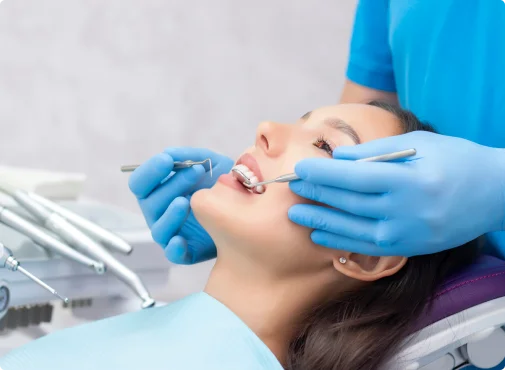Smooth Extraction and Recovery: Say Goodbye to Your Wisdom Teeth
Eagle Family Smiles, led by Dr. Makhani, is a premier family dental care practice that provides top-notch oral care services in Chester Springs. One of the most common issues that our patients face is pain around wisdom teeth, which can lead to severe oral health problems if left untreated.
The eruption of wisdom teeth generally occurs in the late teenage years or early twenties. However, it is not uncommon for these teeth to become impacted due to limited space within the jaw or the angle at which they grow. Among the various types of impacted wisdom teeth, the most prevalent is the “mesial” type, indicating that the tooth is tilted towards the front of the mouth.
Impacted wisdom teeth can lead to various issues, including gum tenderness, swelling, and even severe pain. Teeth that have only partially or fully emerged and are impacted present a challenge when it comes to oral hygiene, making them prone to decay, recurring infections, and gum disease.

At Eagle Family Smiles, we provide expert dental oral surgery services for our valued patients in Chester Springs. With Dr. Makani’s expertise and our state-of-the-art equipment, we ensure that every patient receives optimal oral care and gets a beautiful smile. We have the necessary technology such as Panoramic X-ray or 3D Digital X-ray (CBCT) to evaluate the position of your wisdom teeth. Based on your unique condition most wisdom teeth can be extracted in our office and if Dr. Makani thinks that you would need an Oral Surgeon to extract your wisdom teeth he would give you a referral to see them.
There are three types of impactions – soft tissue impaction, partial bony impaction, and complete bony impaction – each requiring a specific approach for removal. Soft tissue impaction occurs when the gum tissue faces a space constraint, causing difficulties in retracting and cleaning the tooth effectively. Partial bony impaction, on the other hand, allows the tooth to partially emerge, leading to chewing problems and cleaning difficulties. Complete bony impaction, as the name suggests, occurs when the tooth is fully embedded in the jawbone or is partially visible, requiring complex surgical techniques for removal.
There are several reasons to remove impacted wisdom teeth, including gum infection (pericoronitis), cyst formation, possible crowding of teeth, and damage to adjacent teeth. Pericoronitis, a localized gum infection, is the most common clinical problem that we see, leading to pain, swelling, and chewing difficulties. Cysts may also form as a result of impacted teeth and slowly destroy adjacent jawbone and teeth. Additionally, impacted wisdom teeth can contribute to crowding, primarily in the front teeth, which is most noticeable after orthodontic treatment. Retained, impacted wisdom teeth may also damage adjacent teeth, leading to gum disease, bone loss, and decay.
At Eagle Family Smiles, we provide expert dental implant services and oral surgery for our valued patients in Chester Springs. With Dr. Makhani’s expertise and our state-of-the-art equipment, we ensure that every patient receives optimal oral care and gets a beautiful smile.
Removing impacted wisdom teeth at a young age, particularly in the teenage years or early twenties, can lead to a faster and more predictable healing process with fewer complications. Failure to extract impacted wisdom teeth can lead to potential complications in the future, resulting in a prolonged and more complex recovery process with an increased risk of complications.
The dentist would first examine your mouth after consulting with appropriate X-rays. Then the dentist will administer a local anesthetic to numb the area around the tooth to be extracted. The dentist will make sure that you don’t feel any pain during the procedure. Once the area is numb the dentist will use special instruments to remove the tooth from the socket. If the tooth is impacted or partially erupted, then a small incision into the gum tissue would be required to access the tooth, After the tooth is extracted, the dentist may place stitches to close the surgical site. A piece of sterile gauze is placed over the extraction site to help control bleeding and promote blood clot formation. The dental clinical team will give you detailed post-operative instructions on how to take care of the extraction site at home. A follow-up appointment may be necessary to monitor the healing process and remove any stitches if necessary.
The cost of wisdom tooth removal is determined by various factors, including the complexity of the extraction and the anesthesia required. The dentist will need to review x-rays, complete an examination, and determine the best anesthesia option during consultation before providing an accurate estimate. The extent of insurance coverage for the procedure will vary according to the policy of each insurance company.
Minor bleeding and pain are expected on the first day following the procedure, and swelling may peak on the second day and begin to subside on the third day. Pain levels will vary depending on the individual, with some experiencing mild discomfort and others more severe pain. Ice can be used to limit swelling. Patients taking antibiotics should be aware that birth control pills may become ineffective and should take appropriate precautions.
Yes, there can be complications such as damage to the sensory nerve, sinus communication, infections, and dry sockets. It is important to follow post-operative instructions carefully to minimize these risks. If any complications do occur, the dentist will review them with the patient and provide appropriate treatment. Dry sockets are the most common problem people experience following dental surgery and can be treated with a medicated dressing placed in the empty tooth socket. Infections may require an office visit and antibiotics. Patients may also experience temporary problems such as stiffness of the jaws, chafing around the corners of the lips, facial bruising, and blood oozing from the extraction sites.